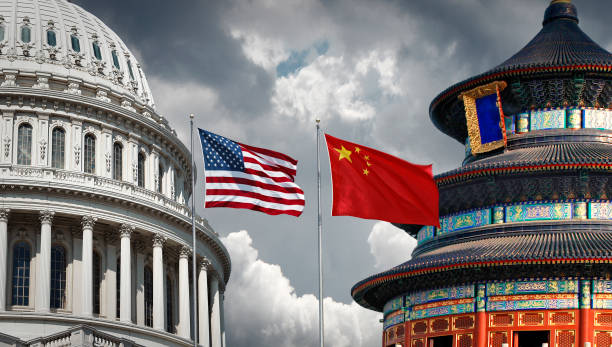Chinese Interpreters: Enhancing American Innovation and Technology

Interpreters play a vital role in international collaboration, especially in the technology sector. For American companies working with Chinese partners, clear communication is essential to drive innovation and maintain a competitive edge.
Language barriers and cultural differences can pose challenges that impede progress and disrupt projects, making skilled interpreters indispensable.
These professionals ensure that ideas, technical terms, and intentions are accurately conveyed, reducing the risk of misunderstandings. Their expertise allows teams to concentrate on their objectives without being hindered by language or cultural obstacles.
As global partnerships continue to influence the technology landscape, the demand for qualified interpreters is set to rise. Their contributions not only facilitate communication but also strengthen connections and support innovation.
How Chinese Interpreters Contribute to Innovation
 The contribution of Chinese interpreters to innovation in the American technology industry is substantial and multifaceted. They are key players in ensuring that collaborative projects between American and Chinese tech companies are effective and successful.
The contribution of Chinese interpreters to innovation in the American technology industry is substantial and multifaceted. They are key players in ensuring that collaborative projects between American and Chinese tech companies are effective and successful.
This role is critical, particularly in areas of research and development and intellectual property negotiations, where precision and clear understanding are paramount.
Enhancing Communication in Research and Development
Interpreters are vital in translating complex technical concepts during the development of new technologies. For example, when an American technology firm works with a Chinese manufacturer on a new gadget, interpreters ensure that technical specifications and design elements are correctly communicated.
Their accurate interpretation is essential to maintain the integrity of the project and avoid costly errors.
Supporting Intellectual Property Discussions
In the sensitive area of intellectual property, the role of Chinese interpreters becomes even more significant. They accurately translate legal terms and specialized jargon, protecting the interests of both American and Chinese parties.
This precise understanding is crucial in negotiations and legal discussions concerning IP rights and patents, safeguarding the innovations at stake. Interpreters facilitate clear communication in scenarios where tech companies explore joint ventures or partnerships, laying a solid foundation for future technological breakthroughs.
They also assist American companies in understanding and complying with the unique regulations of the Chinese market, such as cybersecurity laws.
The Increasing Importance of Chinese Interpreters in Technological Innovation
The need for Chinese interpreters in the American technology industry is growing quickly. This increase comes from more partnerships and collaborations between American and Chinese technology companies.
Both countries lead in areas like artificial intelligence, renewable energy, and telecommunications, making clear communication essential. Chinese interpreters play a key role in helping both sides understand each other during technical discussions, negotiations, and joint projects.
Their work ensures that ideas and goals are shared accurately, making progress possible.
However, meeting this growing demand isn’t easy. The technology industry uses complex terms and concepts that require interpreters to have both strong language skills and technical knowledge.
Interpreters also need to keep learning as new technologies and terms emerge. Staying updated is important to make sure their work remains accurate and helpful.
It can also be hard to find interpreters who can handle these challenges. Miscommunication can slow down innovation and collaboration. Some schools and training programs, like those at the Monterey Institute of International Studies, are helping by teaching interpreters the skills needed for this work.
To make managing interpreters easier, many companies are now using interpreting management solutions. These system help businesses find and organize skilled interpreters for their projects. With these solutions, companies can ensure they have the right professionals for the job, improving communication and keeping projects on track.
The Future of Interpretation in Technology
The role of interpreters in the tech industry is changing with the advancement of technology. While new tools and technologies are emerging, the unique abilities of human interpreters remain crucial.
Technological advancements, such as AI-driven translation tools and real-time interpretation software, are reshaping the field of interpretation. The complexity and sensitivity of human communication in tech negotiations and collaborations demand a level of understanding and adaptability that currently only human interpreters can provide.
Innovations in Interpretation Technology
The landscape of interpretation technology is constantly evolving. Tools like Google Translate and Microsoft Translator are becoming more sophisticated, offering real-time translation services. These tools are invaluable for quick translations but often lack the accuracy needed for technical and nuanced conversations.
The Evolving Role of Human Interpreters
Despite the growth of technology in this field, the demand for human interpreters in the tech industry remains significant. Machines can translate words, but they cannot fully grasp cultural context or convey the subtleties of tone and intent.
For instance, in negotiations or when discussing complex technical concepts, the precision and understanding that a skilled interpreter brings are essential. This highlights the importance of human touch in interpretation, especially in a sector as dynamic and specialized as technology.
Looking forward, we might see a collaboration between technology and human expertise, where interpreters use advanced tools to enhance their efficiency and accuracy.
The core of interpretation—understanding the depth of human communication—will likely remain a human-centric skill. This balance between technology and human skill is vital in ensuring that global collaboration in the tech industry continues to thrive and grow.
Clear understanding is crucial for successful collaborations between American and Chinese tech companies. Interpreters help ensure accurate exchanges during key discussions in areas like research, development, and intellectual property, enabling progress and strong partnerships.
As the need for interpreters grows, managing their services efficiently is essential. Tools like Interpreter IO make it easy to organize and schedule skilled professionals, keeping projects on track without delays.
Streamline your interpreter management with Interpreter IO and ensure smooth collaboration for your business.
